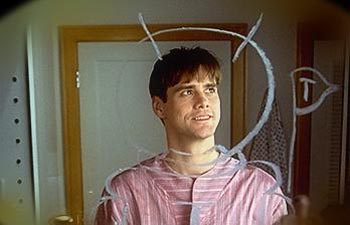Prison Tube
Jim Carrey tries to escape the box
A REAL SURPRISE--who expected one of the very best films of the year from uneven director Peter Weir and master of butt comedy Jim Carrey? It wasn't Carrey's self-love and crudeness but Weir's principles that made me want to avoid The Truman Show. The deadly earnestness of Dead Poets Society was enough to keep me away from Weir's newest work for life. The previews for The Truman Show--showing thousands gathered around a huge TV screen--looked like Gumpzilla with America rallying to its 14-story-tall chum. (In the context of the film, though, the scene isn't about the goodness of the little people.)
The trailers are sorely misleading; The Truman Show is actually a science-fiction-tinged allegory about media and religion. The most popular TV show in history broadcasts round-the-clock footage of a man (Carrey) who has been confined since birth, without knowing it, in a huge soundstage--"the only man-made structure besides the Great Wall of China visible from outer space"--alive with thousands of cameras. Truman Burbank (Truman, as in the '50s, and Burbank, as in the studio-ridden tank-town on the outskirts of Hollywood) is the perfect TV sitcom creation. Through exposure to the right kind of actors and dialogue, he's been reduced to smiling, sexless harmlessness. He works as an insurance salesman, and his domineering mother and his pleasantly coarse buddy-buddy Marlon (Noah Emmerich) keep him in line.
The soundstage town where Burbank lives, Seahaven, is in real life a Florida planned community that seems to have been built for 6-foot-tall Fisher-Price persons. (The place echoes the seaside town in Wales where TV's The Prisoner was filmed.) The Olympian artist Christof (Ed Harris), who came up with the idea for the all-encompassing show, succumbed to a human impulse to make life orderly and beautiful, and Seahaven is the unnatural, out-of-balance result. Christof is not a monster; he's a paternal God. (In one lovely shot, Christof caresses the nose of the colossal projected image of the sleeping Truman.) Having all of the comforts of home, including a brisk, motherly wife, Meryl (Laura Linney), who is already planning their first child, Truman is set for life. But he's at first tempted, and then obsessed, by the idea of escape from this perfect, sterile fishbowl.
The Truman Show doesn't make the old point that the media are corrupt; instead, it suggests that television has displaced religion as a form of worship and social control, and that a new Enlightenment can break its seemingly Godlike power. Weir's old-fashioned style is an asset here. In its warmth, accessibility and sophistication--in its bravery and its sharp satire--The Truman Show marks a return to the strengths American cinema once had, in those years when it called the audience to liberation, instead of to panic and submission. In the end, Carrey makes the transformation from Protean comic to Promethean hero.
[ San Jose | Metroactive Central | Archives ]
Copyright © Metro Publishing Inc. Maintained by Boulevards New Media.
![]()

The New Prometheus: The life of one man (Jim Carrey) and one TV program coincide in Peter Weir's 'The Truman Show.'
The Truman Show (PG; 104 min.), directed by Peter Weir, written by Andrew Niccol, photographed by Peter Biziou and starring Jim Carrey, Ed Harris and Laura Linney.
From the June 4-10, 1998 issue of Metro.
![[Metroactive Movies]](/movies/gifs/movies468.gif)